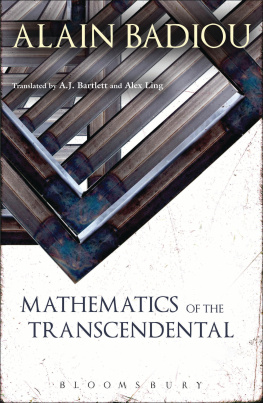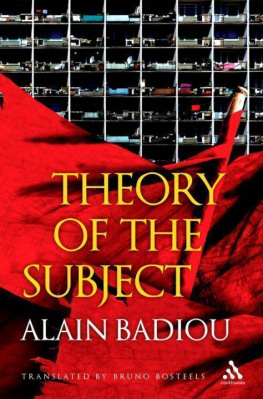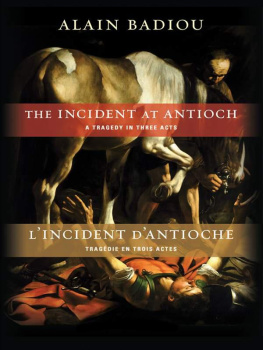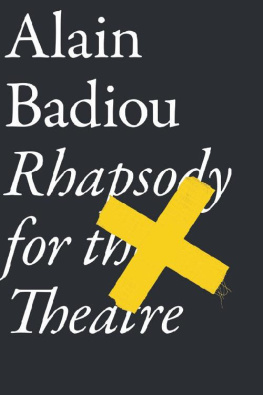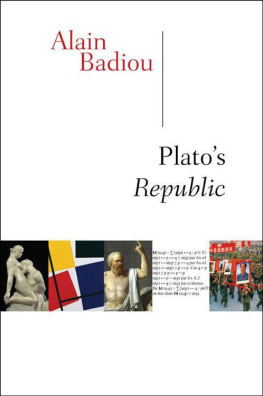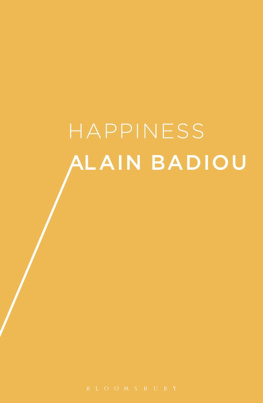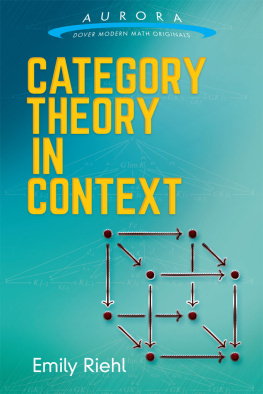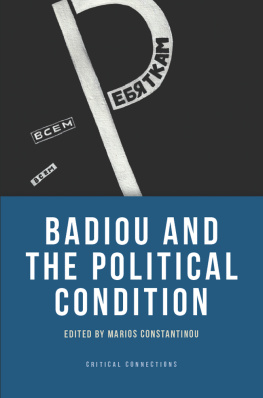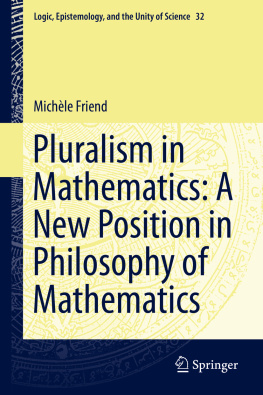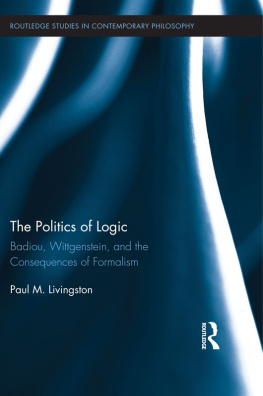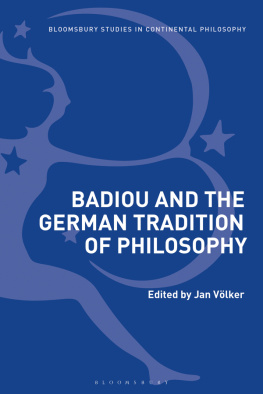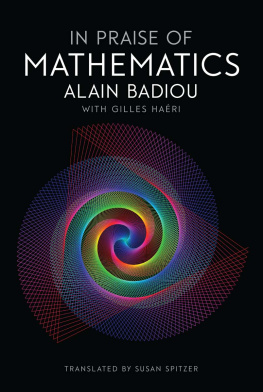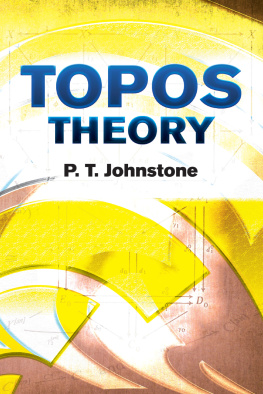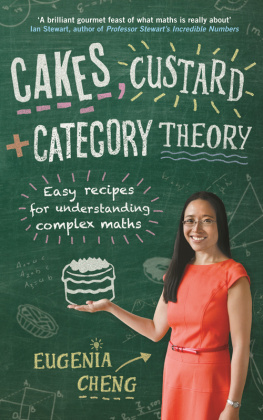MATHEMATICS OF THE TRANSCENDENTAL
ALSO AVAILABLE FROM BLOOMSBURY
Being and Event, Alain Badiou
Conditions, Alain Badiou
Infinite Thought, Alain Badiou
Logics of Worlds, Alain Badiou
Theoretical Writings, Alain Badiou
Theory of the Subject, Alain Badiou
MATHEMATICS OF THE TRANSCENDENTAL
Alain Badiou
Edited, translated and with an introduction by A. J. Bartlett and Alex Ling

TABLE OF CONTENTS
There is no difference between what I have done and what such philosophers as Plato, Descartes, Leibniz, or Hegel have done, a hundred times over since the very origins of our discipline: reorganizing a thorough, if not creative, knowledge of mathematics, by means of all the imagining powers of language.
BEING AND EVENT, XIV
I hope that I say nothing imprecise in mathematics, but also nothing that is mathematically proffered.
THEORY OF THE SUBJECT, 20910
The two works made available here for the first time in either English or French Topos, or Logics of Onto-Logy: An Introduction for Philosophers and Being-There: Mathematics of the Transcendental represent Badious early forays into category theory (and in particular the sub-branch of topos theory) from two vastly different philosophical angles. While the former comes hot on the heels of the publication of his first great book, Being and Event, the latter captures in painstaking detail the conceptual development of what would ultimately become the belated sequel to this foundational work, Logics of Worlds. As such, they catalogue Badious philosophico-mathematical trajectory over a period of nearly two decades a period of astonishing philosophical and artistic productivity
Given the intervallic nature of this work, it should come as little surprise that both books can be seen to serve equally different agendas. If in the first book Badiou approaches category theory (at least initially) as a foundational and hence ontological rival to set theory noting that they each define entirely different directions of thought regarding the prescriptions for the foundations of philosophy by the second this ontological competition had shifted toward something of an onto-logical communion, whereupon category theory came to designate the logical phenomenology that forms the complement to his set-theoretic ontology.
Simplifying brutally, Badious primary concern with Topos is that, having only recently established an entire philosophy on the basis of a specific branch of mathematics that (crucially) serves as a foundational system for mathematics itself namely, post-Cantorian set theory and having utilized all the conceptual machinery of this system in its elaboration, he nonetheless remained philosophically obliged to account for that other great pretender to the crown of mathematical foundations: category theory. For if mathematics is a thought (that is, if mathematics constitutes a truth-procedure) then what it thinks must itself be (re)thought by any philosophy worthy of the name in its own terms and on its own ground.
And so, following incisive critiques made in particular by Jean-Toussaint Desanti (first at Badious Habilitation and later in a pivotal essay published in Les Temps modernes), Badiou quickly came to recognize that I could not exempt myself from proposing a philosophical interpretation of [set theorys] rival from within my system,
By the time of Being-There however, Badious philosophical and mathematical situation had changed considerably. Far more familiar with category theory (having spent the better part of the last decade ploughing through the fields canonical works), and by now firmly convinced of its relevance to his own project, Badious concern with this work is less to demonstrate the logico-mathematical as well as philosophical differences between the two rival theories than to outline the positive philosophical application of category theory in terms of a transcendental theory of appearing or being-there (which would nevertheless leave his set-theoretic ontology essentially intact).
In short, if Badiou was initially distrustful of category theory and defensive of set theorys foundational status (while at the same time clearly impressed by its technical unfolding), this scepticism transformed over time into a genuine philosophical appreciation of its logical power and its potential to provide a structure capable of accounting for the infinitely varied intensities of appearing, that is, its capacity to formalize appearing itself.
This intense interest in or passion for formalization (to echo one of the central theses of The Century)
Even amongst the scientifically rigorous world of the Cercle dpistmologie, relied as heavily on abstract algebra, topology and the mathematics of Gdel (constructability) and Cohen (genericity and forcing) as it did on Marxian orthodoxy and the Hegelian dialectic.
If, however, mathematical formalization (in the manner of Jacques Lacan) that Badiou was able to present a truly systematic philosophy (even if many crucial aspects of this work are foreshadowed in Theory of the Subject). That this philosophy unfolded so systematically was of course due in no small part to his fundamental thesis on the nature of being and its mathematical inscription, a thesis whose manifold consequences Badiou was able to capture in a single, striking equation: mathematics is ontology.
It is of course in this groundbreaking work that Badiou famously holds that being itself, being qua being, is nothing other than pure multiplicity. Or again, once an object is divested of (or subtracted from) everything that goes into making it a unique thing once we isolate it from its context and strip away each and every one of its qualitative determinations what remains is essentially a multiple of multiples. This pure multiple remainder is literally the being of the object, the elementary there is underlying everything that is there. Crucially, there is no atomic halting point to this infinite de-composition; what we arrive at is not the One (that is, some form of primordial unity), but rather the void, nothingness itself the in-finite dissemination of multiple multiplicity.
It is in direct response to this insight regarding the multiplicity of being that Badiou makes his most celebrated and wide-reaching philosophical decision, namely, that mathematics is ontology. For if ontology is, as Aristotle declared in his Metaphysics, the science of being qua being and if pure being, or being subtracted from all of its particular qualities and attributes, is, as Badiou argues, none other than inconsistent (or uncounted) multiplicity then the only science adequate to thinking such multiple being is mathematics. Indeed, thinking pure multiplicity is precisely what mathematics does on a daily basis. No other discourse be it theological, linguistic, relativist, vitalist, phenomenological, or whatever so much as comes close to being up to this task; mathematics and mathematics alone gives us the thought of being.
Needless to say, Badious declaration that ontology is mathematics is in no way to suggest that being is itself mathematical. To do so would be to illegitimately conflate ontology, which is simply the discourse on being, with the object of this discourse, namely, being itself. Rather, mathematics or more precisely, Zermelo-Fraenkel set theory (ZFC), the axiomatic system that purports to offer a solid foundation for mathematics

